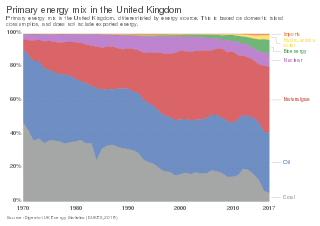
A public utility company is an organization that maintains the infrastructure for a public service. Public utilities are subject to forms of public control and regulation ranging from local community-based groups to statewide government monopolies.

Scottish Power is a vertically integrated energy company based in Glasgow, Scotland. It is a subsidiary of Spanish utility firm Iberdrola.

In the electricity sector in the United Kingdom, the National Grid is the high-voltage electric power transmission network serving Great Britain, connecting power stations and major substations and ensuring that electricity generated anywhere on it can be used to satisfy demand elsewhere. The network covers the great majority of Great Britain and several of the surrounding islands. It does not cover Northern Ireland, which is part of a single electricity market with the Republic of Ireland.

The Office of Gas and Electricity Markets (Ofgem), supporting the Gas and Electricity Markets Authority (GEMA), is the government regulator for the electricity and downstream natural gas markets in Great Britain. It was formed by the merger of the Office of Electricity Regulation (OFFER) and Office of Gas Supply (Ofgas).

Rural electrification is the process of bringing electrical power to rural and remote areas. Rural communities are suffering from colossal market failures as the national grids fall short of their demand for electricity. As of 2017, over 1 billion people worldwide lack household electric power – 14% of the global population. Electrification typically begins in cities and towns and gradually extends to rural areas, however, this process often runs into obstacles in developing nations. Expanding the national grid is expensive and countries consistently lack the capital to grow their current infrastructure. Additionally, amortizing capital costs to reduce the unit cost of each hook-up is harder to do in lightly populated areas. If countries are able to overcome these obstacles and reach nationwide electrification, rural communities will be able to reap considerable amounts of economic and social development.
National Grid plc is a British multinational electricity and gas utility company headquartered in London, England. Its principal activities are in the United Kingdom, where it owns and operates electricity and natural gas transmission networks, and in the Northeastern United States, where as well as operating transmission networks, the company produces and supplies electricity and gas, providing both to customers in New York and Massachusetts.
A Meter Point Administration Number, also known as MPAN, Supply Number or S-Number, is a 21-digit reference used in Great Britain to uniquely identify electricity supply points such as individual domestic residences. The system was introduced in 1998 to aid creation of a competitive environment for the electricity companies, and allows consumers to switch their supplier easily as well as simplifying administration. Although the name suggests that an MPAN refers to a particular meter, an MPAN can have several meters associated with it, or indeed none where it is an unmetered supply. A supply receiving power from the network operator (DNO) has an import MPAN, while generation and microgeneration projects feeding back into the DNO network are given export MPANs.

The energy policy of the United Kingdom refers to the United Kingdom's efforts towards reducing energy intensity, reducing energy poverty, and maintaining energy supply reliability. The United Kingdom has had success in this, though energy intensity remains high. There is an ambitious goal to reduce carbon dioxide emissions in future years, but it is unclear whether the programmes in place are sufficient to achieve this objective. Regarding energy self-sufficiency, UK policy does not address this issue, other than to concede historic energy security is currently ceasing to exist.
E.ON UK is a British energy company and the largest supplier of energy and renewable electricity in the UK, following its acquisition of Npower. It is a subsidiary of E.ON of Germany and one of the Big Six energy suppliers. It was founded in 1989 as Powergen, and was listed on the London Stock Exchange and was once a constituent of the FTSE 100 Index. It has been a subsidiary of E.ON since 1 July 2002.

SSE plc is a multinational energy company headquartered in Perth, Scotland. It is listed on the London Stock Exchange, and is a constituent of the FTSE 100 Index. SSE operates in the United Kingdom and Ireland.

A charging station, also known as a charge point or electric vehicle supply equipment (EVSE), is a piece of equipment that supplies electrical power for charging plug-in electric vehicles.

Solar power represented a very small part of electricity production in the United Kingdom until the 2010s when it increased rapidly, thanks to feed-in tariff (FIT) subsidies and the falling cost of photovoltaic (PV) panels.

The Eugene Green Energy Standard was an international standard to which national or international green electricity labelling schemes could be accredited to confirm that they provide genuine environmental benefits. It was designed to encourage the generation and use of additional renewable energy sources for electricity generation, although the limited use of additional natural gas-fired cogeneration plant was also supported. Initially funded in part through the EU's clean-e programme, but also including some participants from outside Europe, the Eugene standard was formally discontinued after February 2009.

The availability and uptake of green electricity in the United Kingdom has increased in the 21st century. There are a number of suppliers offering green electricity in the United Kingdom. In theory these types of tariffs help to lower carbon dioxide emissions by increasing consumer demand for green electricity and encouraging more renewable energy plant to be built. Since Ofgem's 2014 regulations there are now set criteria defining what can be classified as a green source product. As well as holding sufficient guarantee of origin certificates to cover the electricity sold to consumers, suppliers are also required to show additionality by contributing to wider environmental and low carbon funds.
In the United Kingdom, an electricity supplier is a retailer of electricity. For each supply point the supplier has to pay the various costs of transmission, distribution, meter operation, data collection, tax etc. The supplier then adds in energy costs and the supplier's own charge. Regulation of the charging of customers is covered by the industry regulator Ofgem.
A feed-in tariff is when payments are given by energy suppliers if a property or organisation generates their own electricity using technology such as solar panels or wind turbines and feeds any surplus back to the grid. In the United Kingdom, they were entered into law by the Energy Act 2008 and took effect from April 2010. The scheme closed to new applicants on 31 March 2019.

The Electricity Act 1989 provided for the privatisation of the electricity supply industry in Great Britain, by replacing the Central Electricity Generating Board in England and Wales and by restructuring the South of Scotland Electricity Board and the North of Scotland Hydro-Electric Board. The Act also established a licensing regime and a regulator for the industry called the Office of Electricity Regulation (OFFER), which has since become the Office of Gas and Electricity Markets (OFGEM).
The Big Six were the United Kingdom's largest retail suppliers of gas and electricity, who dominated the market following liberalisation in the late 1990s. By 2002, six companies – British Gas, EDF Energy, E.ON, RWE npower, ScottishPower and SSE – had emerged from the 15 former incumbent monopoly suppliers.

Solarplicity Energy Limited was a renewable energy company based in Hertfordshire, England. In August 2019 the company became the 13th energy supplier to collapse since 2018, affecting around 7,500 domestic and 500 business customers.

Flow Energy was an energy supplier in the United Kingdom owned by Co-op Energy. Its headquarters were in Ipswich, Suffolk. The company was launched as a small independent domestic energy supply company in April 2013, supplying gas and electricity to homes throughout the UK. Flow Energy was acquired by Co-op Energy in May 2018, and the Flow brand continued to be used until August 2019 when the customers were acquired by Octopus Energy.













